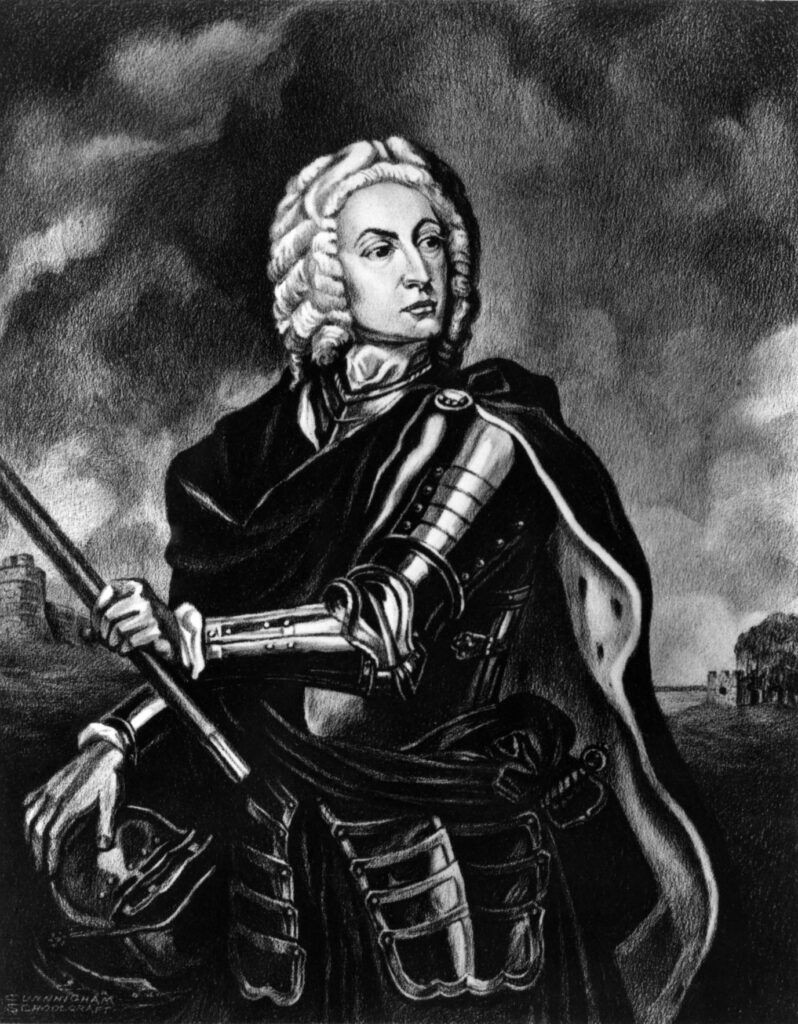James Oglethorpe stands as a pivotal figure in the establishment of the colony of Georgia, envisioned as a social experiment and a strategic military buffer for Britain. His endeavors, from securing the charter in 1732 to leading the first colonists to Savannah, showcased his vision and determination. Oglethorpe’s multifaceted role encompassed social reform, military command, and colonial administration, shaping the early years of Georgia. This exploration delves into the complexities of Oglethorpe’s leadership and the dynamics within early colonial Georgia.
Born into a politically engaged family in London in 1696, Oglethorpe’s early life was marked by both academic pursuits and military inclinations. Though briefly at Oxford University, his fascination with European conflicts drew him to military service, becoming an aide to Prince Eugene of Savoy. Returning to England, he entered Parliament in 1722, dedicating himself to national and international matters.
Oglethorpe’s trajectory shifted dramatically following the imprisonment and death of his friend Robert Castell due to harsh prison conditions for debtors. This personal tragedy ignited Oglethorpe’s passion for prison reform. As chairman of a parliamentary committee, he exposed the deplorable realities of London jails, advocating for changes to address the plight of debtors. While prison reform became a significant achievement, Oglethorpe, along with colleagues like John Lord Viscount Percival, envisioned a more expansive solution to poverty in England: the establishment of a new colony in America. This colony would offer a fresh start for the “worthy poor,” transforming them into productive citizens, free from the rigid class structures of England. Initially driven by charitable motives, the Georgia project soon incorporated military and economic imperatives.
The vision for Georgia evolved, and by 1732, strategic considerations became paramount. Oglethorpe’s persuasive arguments convinced King George II to grant a charter for Georgia, appointing Oglethorpe as one of the Trustees. The focus shifted from solely aiding debtors to selecting skilled individuals capable of contributing to the colony’s prosperity. Hopes for Georgia included the production of valuable commodities like silk and wine, fostering a colony of self-sufficient settlers rather than vast plantations.
In November 1732, Oglethorpe led the first group of colonists to Georgia. Despite being prohibited from holding office or owning land by the charter, Oglethorpe dedicated himself to the colony’s success. Upon arrival at Yamacraw Bluff, he established a crucial relationship with Yamacraw chief Tomochichi, laying the foundation for peaceful coexistence. Savannah was meticulously planned, reflecting the Trustees’ ideals of an egalitarian society, albeit one with limitations, such as the exclusion of women from land ownership.
Oglethorpe’s leadership in the nascent colony was characterized by his tireless work ethic and at times, divergence from Trustee policies. He demonstrated pragmatism by allowing persecuted religious minorities to settle in Georgia, contrasting with rigid policies from London. However, he remained steadfast in his opposition to slavery, a stance that would eventually be challenged as Georgia evolved. His approach to Native American relations was notably enlightened for the era, emphasizing respect and treaty-based land agreements. Although lacking a formal title beyond Trustee, Oglethorpe was the undisputed leader, guiding Georgia through its formative years.
Georgia’s strategic importance as a military buffer against Spanish Florida soon overshadowed its initial charitable aims. As Spanish presence in St. Augustine grew, Oglethorpe’s focus intensified on defense. Facing insufficient support from both Trustees and Parliament, Oglethorpe even mortgaged his own properties to finance the colony’s burgeoning needs, demonstrating his unwavering commitment to Georgia’s survival.
Recognizing the escalating military threat, Oglethorpe returned to London to lobby for support. In 1737, he secured a commission as a colonel and a regiment of British soldiers, bolstering Georgia’s defenses. Despite limited prior military command experience, he was appointed “General and Commander in Chief,” reflecting the urgency of the situation. This appointment, while not a full generalship in rank, granted him command over broader forces in the region during impending conflict with Spain. He later achieved the rank of brigadier general in 1743.
The War of Jenkins’ Ear provided the context for Oglethorpe’s military leadership. In 1740, he launched an offensive against St. Augustine, which ultimately failed. However, in 1742, he successfully defended Georgia against a Spanish invasion at the Battle of Bloody Marsh, a decisive victory that secured Britain’s southern colonies. This triumph cemented Oglethorpe’s status as a national hero in England and earned him promotion within the British Army.
Despite his military successes, Oglethorpe faced challenges. After another attempt to capture St. Augustine in 1743, he was recalled to London to address misconduct allegations brought by a disgruntled officer. While exonerated and reimbursed by Parliament, these events marked a shift in Oglethorpe’s life. In 1744, he married Elizabeth Wright and began a new chapter, dividing his time between London society and his estate. Although he remained a Trustee of Georgia, his influence waned as the Trustees gradually relaxed his initial strict policies on land, rum, and slavery, leading to his reduced involvement by 1750. Georgia transitioned into a royal colony by 1752, marking the end of the Trustee period.
Oglethorpe’s later life included continued public service in Parliament until 1754 and even a brief, clandestine return to military action in Europe during the Seven Years’ War. He lived to witness the American Revolution and expressed positive sentiments towards the newly formed United States. James Oglethorpe died in 1785, leaving a lasting legacy as the founder of Georgia, remembered for his humanitarian ideals, military leadership, and the enduring impact on the landscape and identity of Georgia. His name remains deeply embedded in the state’s geography and institutions, a testament to his profound contributions.


